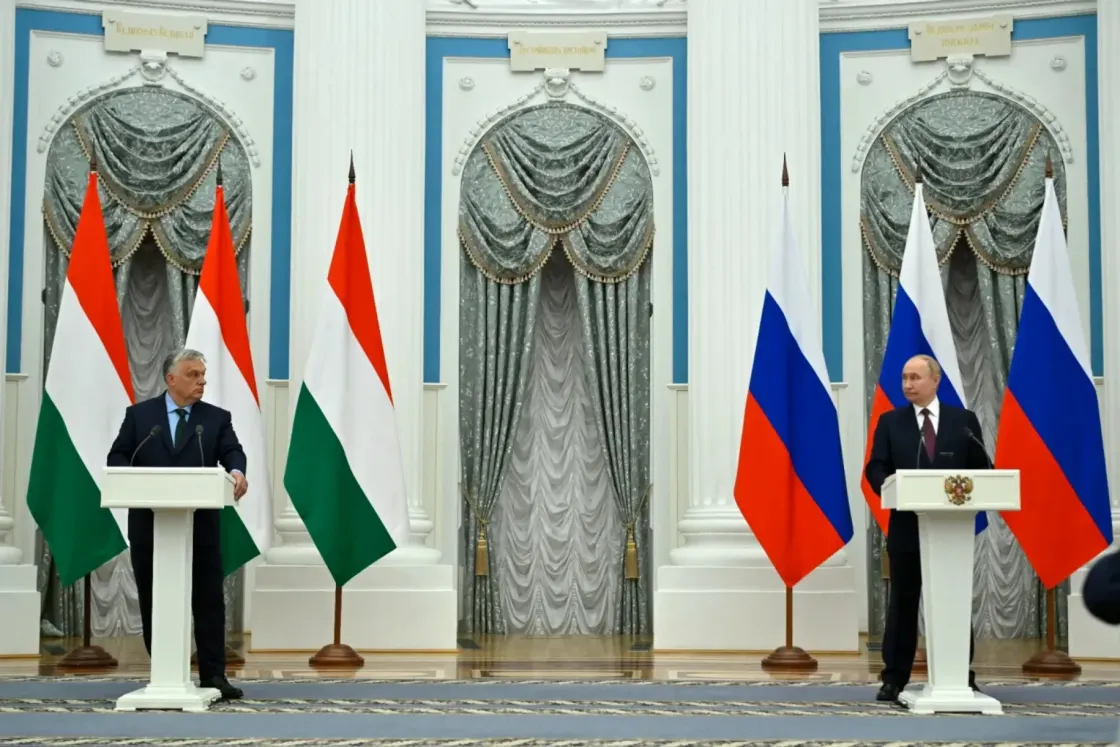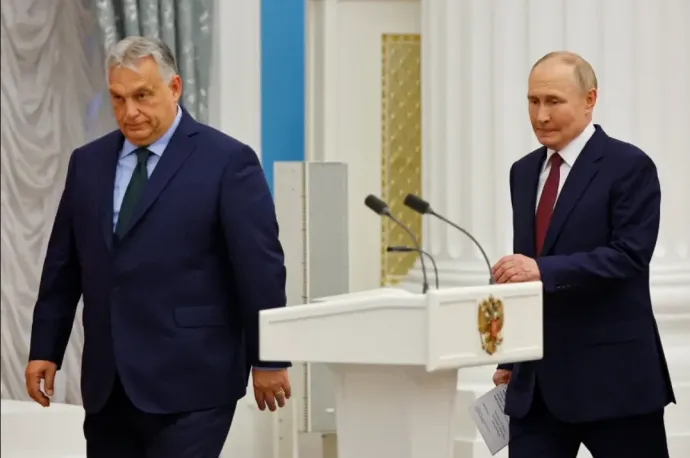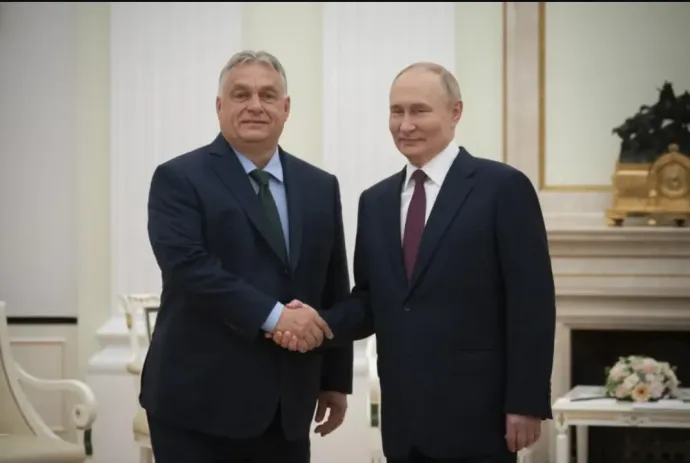
"I understand that you have come here not only as a partner but as a representative of the EU Presidency," Russian President Vladimir Putin said in Moscow at a joint press conference with Hungarian Prime Minister Viktor Orbán on Friday. The head of the Hungarian government, who took over the rotating EU presidency in early July, was told by EU leaders that he could not negotiate on behalf of the EU. In any case, Orbán went on what he called a "peace mission".
Putin continued his speech by saying that he hoped there would be time to discuss bilateral relations in this complicated situation and that the situation in Ukraine would also be discussed. "I am aware that you were in Kyiv recently, on 2nd July, and now you have come here to discuss all the nuances of this situation," Putin said, according to the interpreter. He indicated that he had been available and that he had previously explained his position.
"I expect you to share with me your position and the European position," he said. Bilateral relations have seen a big drop, with trade in goods between the countries down by more than 35 percent, "but we have work to do and we are continuing to implement the projects".
Orbán said this is their 14th bilateral meeting since 2009, "but this is indeed more special than the others". Partly, because Hungary took over the rotating EU presidency on 1st July and also because the last time they met in Moscow was before the war, in February 2022. "These two circumstances make this meeting special," Orbán said, thanking Putin for hosting him in such difficult circumstances. He added:
"We are running out of countries that can talk to both warring parties. Hungary is slowly becoming the only country in Europe that can talk to everyone involved."
He said he thus wanted to use this opportunity to talk to Putin and get his views on issues of importance to Europe.
Putin: Ukraine is not ready to give up its position
The parties held a press conference after the talks, which was opened by the Russian President. "We have discussed bilateral relations and the international situation," Putin began, saying that mutual trust and respect were the foundations of the relationship between the two countries. "We will continue to work on the expansion of the Paks nuclear power plant", which could mean an increase in capacity, and that "the supply of cheap and clean energy" will be ensured for Hungarian companies. The latest cutting-edge technology will be used in this field, Putin said, with safety and environmental protection in mind. The two countries will also cooperate in the area of medicine. "We urge continued cooperation in the priority areas," he added.
They also had a thorough and straightforward discussion on international issues, including Ukraine. "The Prime Minister told me about his meeting in Kyiv and his proposal to his partner on how to start peace talks," he said. The Russian President said they were open to talks, "but what we hear from the other side is that there is no will to resolve the conflict in any way". Ukraine's sponsors continue to exploit the country "and make it a victim", according to the Russian leader.
"They are not yet ready to give up their position", Putin continued, saying that the Ukrainians do not want a cessation of the fighting, because then the state of war would have to be withdrawn. If that happens, elections will have to be held in Ukraine, which have not yet been held (precisely because of the war). "The chances of the Ukrainian leaders now in power winning elections are close to zero," he said. According to him, the Russian position is that they have a proposal to stop the fighting and start peace talks.
But Putin says a brief suspension of fighting is not enough, and Kyiv would use the ceasefire to redeploy its forces. "Russia is fighting for a final and complete end to the conflict", the terms of which he has already outlined: Ukraine must withdraw its troops from the Donetsk, Kherson, Luhansk and Zaporizhzhya regions.

The Russian President said that since Hungary took over the rotating presidency of the EU, he and PM Orbán have also discussed relations between Russia and the EU. They also discussed the future security architecture. Orbán, Putin said, expressed the well-known position of the West. The Hungarian Prime Minister said his visit had given an impetus to relations. The rotating EU presidency was raised at the meeting, at least according to Putin, although several EU representatives stressed that the EU presidency does not have the mandate to negotiate with Russia on behalf of the EU.
Orbán: Peace Mission
The Hungarian Prime Minister reiterated that this was the 14th bilateral meeting he had held with Putin. "Orbán said that this meeting was special because it took place in a time of war. It is a moment when "Europe needs peace", so "the Hungarian Presidency sees the next six months as a mission of peace". Orbán told Putin that the basis for Europe's development was peace, but there has now been war for two and a half years, which is causing difficulties,
"we do not feel safe, we see images of war and destruction", and the conflict is also affecting economic competitiveness.
"The lesson we have learned over the past two and a half years is that we cannot achieve peace without dialogue and diplomatic channels," he said. He added that he had discussed with Putin " where the path to peace lies". He asked the Russian president three questions:
- What do you think about the peace plans and negotiating formats on the table?
- What do you think about the relationship between ceasefires and peace talks, and when each is possible?
- What do you think about the post-war European security system?
What Vladimir Putin said in response to these questions is not known. Since the beginning of the war, there are few left who can talk to both sides, according to Orbán, "Hungary is one of the very few", which is why he was in Kyiv and why he is now in Moscow. "I have experienced that the positions are far apart", that many steps have to be taken to establish peace, but that the first important step has been taken towards dialogue. The Prime Minister wants to continue this.
Then came a strange interlude, as the press conference seemed to be over, but a journalist shouting a question to Orbán about how Ukrainian President Volodymyr Zelensky reacted to his proposals. "I shared that with the President of the Russian Federation," Orbán replied. Putin smiled in response and walked out of the room with Orbán.
A barrage of reactions
Shortly after 9 am on Friday morning, the Airbus A-319 government plane that usually carries Prime Minister Viktor Orbán took off from Budapest. Orbán travelled to the Russian capital a few days after meeting with Ukrainian President Volodymyr Zelensky in Kyiv.
Bertalan Havasi, the Prime Minister's press secretary, issued a statement to the Hungarian news agency MTI at 11.20 am: "Prime Minister Viktor Orbán has arrived in Moscow as part of his peace mission. He will meet with Russian President Vladimir Putin."
It was only on Thursday that the planned visit to Russia – which in such cases takes days to organise – was made public at all, first reported by VSquare, but not confirmed by the government until the plane landed.
European Council President Charles Michel, however, was quick to point out on social media that the Hungarian Prime Minister, whose country took over the EU Presidency on 1 July for six months, does not have a mandate to negotiate with Putin on behalf of the EU. "The rotating EU Presidency has no mandate to negotiate with Russia on behalf of the EU," he wrote. "The European Council is clear: Russia is the aggressor, Ukraine is the victim. No discussions about Ukraine can take place without Ukraine."

Polish Prime Minister Donald Tusk also reacted to press reports that Viktor Orbán would meet the Russian President again. "The rumours about your visit to Moscow cannot be true, or can they?" – he wrote on X (formerly Twitter), tagging Orbán.
The European Union's Diplomatic Service issued a statement on Friday. They wrote that "Viktor Orbán’s visit to Moscow takes place, exclusively, in the framework of the bilateral relations between Hungary and Russia. The rotating presidency of the Council does not entail any external representation of the Union which is the responsibility of the President of the European Council at the Head of State or Government level and of the High Representative of the Union for Foreign Affairs and Security Policy at Ministerial level.”
“Appeasement will not stop Putin. Only unity and determination will pave the path to a comprehensive, just and lasting peace in Ukraine,” European Commission President Ursula von der Leyen posted on X.
Kyiv-Budapest-Moscow
Orbán last held face-to-face talks with Putin in Beijing last October. That meeting was interpreted in two ways by analysts. Either that Orbán courted Putin at the meeting or, concluding from the public statements, what he actually told him in indirect language was that the current level of relations would not be sustainable, partly because of Moscow's actions.
During the public part of the meeting in Beijing, the Hungarian Prime Minister said that "we have never been in such a difficult situation", and that bilateral relations have suffered a lot "because of the military operation and sanctions". This is closer to the Russian narrative, as the war launched by Russia against Ukraine cannot be called a war under Russian law, only a "special military operation".
Prior to this trip to Moscow, Orbán travelled to Kyiv for the first time since the outbreak of the war, where he held talks with Ukrainian President Zelensky. That trip, too, had been kept top secret, perhaps partly because of the frosty relations between the two countries, and no official announcement had been made about it beforehand.
As we wrote in our previous analysis, when it comes to appearances and much of the content visible to the public, Tuesday's visit was quite similar to what it looked like when a leader of a country in solidarity with Ukraine met with Zelensky. For a long time, it seemed that there would be no press conference, but in the end the two leaders did hold one, and surprisingly enough, Orbán praised "the efforts of the Ukrainian president for peace". The Hungarian Prime Minister's assumption of the rotating EU presidency also provided the occasion for the visit, and it was likely aimed at helping him to establish his new EP party family as well.
At the press conference, he also spoke about the ceasefire, which the Ukrainian newspapers interpreted as a reference to the Russian narrative. "The rules of international diplomacy are slow and complicated. I asked the President to consider whether the order could be reversed and a quick ceasefire could speed up the peace talks. A time-bound ceasefire, which would allow speeding up the peace talks: I have explored the possibilities of this," Orbán said, according to the Hungarian Press Agency, MTI.
It was telling, however, that while Orbán was in Kyiv for talks with Zelensky, his Foreign Minister Péter Szijjártó initiated a phone call with his Russian counterpart Sergey Lavrov. According to the most specific part of the statement on the Russian Foreign Ministry's website, the two sides agreed that Ukraine should guarantee the rights of minorities living on its territory.
As we wrote in our previous analysis, something seems to have shifted, and the Kyiv trip was a sign that the Orbán government does not want to let go of Moscow's hand, but is ready to make gestures towards the North Atlantic Alliance. It is also clear that there have been at least three events since the EP elections (including the meeting with Zelensky) that suggest Orbán may be giving in to his Western critics and changing his policy towards Russia and the US.
However, it is too early to say whether or not there will be a change of direction in Orbán's foreign policy, although he is under constant pressure from the United States. Analysts say, however, that Orbán is also under pressure from Moscow, so he is currently caught between two fires and it is far from certain that he can 'break free' from the Russian grip.
In any case, the fact that the Prime Minister is meeting Putin just days after his visit to Kyiv suggests that he still considers it important to maintain a policy towards Russia that his critics consider to be distinctly pro-Russian.
From Moscow, Orbán is travelling on to Susa, Azerbaijan, where he will attend the summit of the Organisation of Turkic States (OTS) for the next two days.
For more quick, accurate and impartial news from and about Hungary, subscribe to the Telex English newsletter!